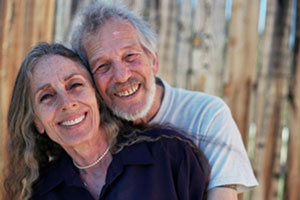by Randy Peyser: Having spent the past twenty-five years providing emotional and spiritual support for those who are life-threatened, and for caregivers, Stephen Levine and Ondrea Levine are  the authors of “Who Dies,” “Embracing the Beloved,” and “A Year to Live,” among others. Their latest work revolves around the theme of “Conscious Living /Concious Dying.”
the authors of “Who Dies,” “Embracing the Beloved,” and “A Year to Live,” among others. Their latest work revolves around the theme of “Conscious Living /Concious Dying.”
Randy Peyser: Can you describe the focus of your work at present?
Stephen Levine: Much of the work that Ondrea and I do is the work of encouraging the mind to sink into the heart. We explore grief — not just the grief of the loss of a loved one, but the loss of safety, confidence, and trust which accompanies grief. We also explore how the energy of grief limits the expression of the heart, and we use meditations to open past that. This work is based on the essential Buddhist meditations. It has to do with mindfulness, to paying attention to the patterns in the body which are associated with each state of mind.
RP: Are there similarities between conscious living and conscious dying?
SL: The basis of conscious living and conscious dying are precisely the same thing. They have to do with paying attention to the moment as it unfolds, and trying to meet it with as much mercy and compassion as possible. If we’re being conscious in this moment then we’ll be conscious in that moment. The less we’re being conscious now, the less we’re being heartful now, and the more difficult our death bed might be.
We’re not talking about waiting until you’re dying to wake-up, we’re talking about completing your birth now, and coming more fully into your life now. We’re talking about impermanence. We’re talking about living in a world where there is no real control. The more control we exert, the harder our bellies become, the tighter our hearts get, and the less happy we are.
Ondrea and I are coming from the place that happiness is a superstition, but joy is your birthright. Even death doesn’t stop that when the heart is allowed its natural expression.
RP: What is your distinction between happiness and joy?
SL: Happiness is based on getting on what you want and joy is based on being who you are. Everybody’s known joy at certain times when they were doing absolutely nothing. Happiness always comes from doing, getting, having, whereas joy might come from laying in a hammock, or sitting by a stream.
Joy is very often experienced in a passive modality — you’re watching your daughter get married or your son graduate. Observing the momentary happiness in another brings joy to you.
Joy is always present in a sense. Happiness is momentary and only comes from getting what we want. Happiness is so fragile. There’s a kind of hysteria in certain qualities of happiness, whereas joy is deep and grounded. From joy you can help others. From happiness you often can feel separate from others because you got something and they didn’t. But everybody’s got joy. It’s our birthright.
The ironic thing is we have almost no contact with joy because of our obsession with happiness. On occasion, Ondrea and I will be with someone on their death beds who says, “You know, I got everything I wanted. There were lots of moments of happiness. But if I had to be truthful, there was very little joy.” Fragile, momentary, coming and going, impermanent. Happiness one moment, shouting the next. The absence of what they call “genuine joy” in their lives is disconcerting to them on their death beds.
We’ve been told to go after what we want, but we have not been told about the consequences of desire. How it hurts us, blinds us, or affects our loved ones.
When I’m saying desire, people quickly jump to lust. Lust is nothing next to the subtle desire for constantly being applauded, or being told that you’re better than the hateful mind tells yourself you are. It’s that desire that is always there, the desire that is the voice of our every day common grief. It is the desire to feel better; the desire to not be in so much pain, or to not be so confused; the desire, even when we are in pain, to appear as though we are not. So merciless are we.
RP: You mean toward ourselves? You’ve often talked about the importance of having mercy. In fact, you’re one of the few people I know who uses that word.
SL: The word fell out of use because mercy meant guilt and looking for an intercessionary divine power. Really, mercy is when you see someone in pain, you feel their pain.
Someone once asked the Dalai Lama, “We’re supposed to have no attachment, right?” And the Dalai Lama replied, “Well, you have to have some attachment or there would be no compassion.”
Connectedness is very important. It is wisdom in action. Wisdom says. “Everything’s empty.” Compassion and mercy say, “Everything’s full.” And when someone’s in pain, you don’t see how it’s empty, you wonder how you can help. That’s the difference.
















































